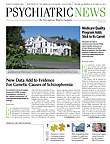A test to facilitate differential diagnosis between unipolar and bipolar depression was described in a study reported online in the British Journal of Psychiatry August 22. The lead researcher was Jorge Almeida, M.D., Ph.D., then an assistant professor of psychiatry at the University of Pittsburgh and now affiliated with Brown University.
The test is based on pattern-classification analysis, a technique recently applied to analyzing brain-imaging data, Almeida told Psychiatric News. “Most importantly, while traditional imaging analysis relates to group means, this new approach relates to a specific subject within the sample. For this reason, it can be considered a breakthrough in neuroimaging studies and in possible clinical applicability.”
Also, the test entails a kind of fMRI imaging called arterial spin labeling, in which blood flow in the brain can be measured without using invasive techniques.
Almeida and his colleagues used pattern-classification analysis and arterial spin labeling to measure blood flow in the anterior cingulate cortex—a brain area involved in mood regulation—in 18 subjects with unipolar depression, 18 subjects with bipolar disorder who were in a depressive episode, and 18 healthy controls. They found that the amount of blood flow in this region differentiated individuals with bipolar depression from individuals with unipolar depression with 81 percent accuracy (83 percent sensitivity, 78 percent specificity). In contrast, the amount of blood flow in this region did not accurately distinguish between unipolar depression subjects and healthy subjects.
Almeida believes that these results are encouraging from a clinical point of view because, as he explained, “Clinical psychiatrists are capable of doing a very good job at discriminating between a depressed person and a nondepressed person, so there is no real clinical utility to differentiating a depressed person from a control using neuroimaging. However, this differentiation is still poor when trying to discriminate between unipolar and bipolar depression, especially if a clear history of mania/hypomania is not present. So we have a clear benefit using neuroimaging as a supplemental tool for the differential diagnosis of a depressive episode.”
As for the timeline for availability of such a test, he said, “All of the technologies discussed in our manuscript are available in many university-affiliated centers. However, our study had a relatively small sample size and was done only in females, so this limits the generalizability of the results. Thus, before such a test becomes clinically available, the results need to be replicated using independent and larger samples.”
The study was funded by the National Institutes of Health, the Brain and Behavior Research Foundation, and the Wellcome Trust. ■
